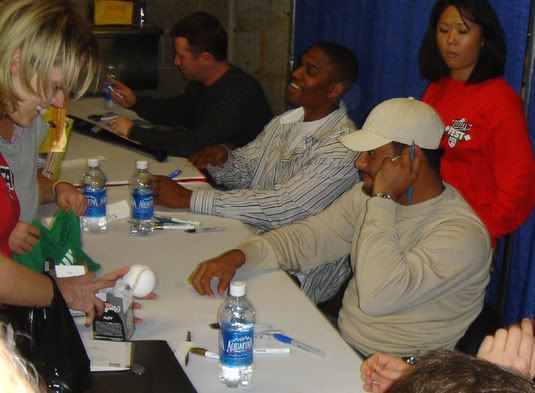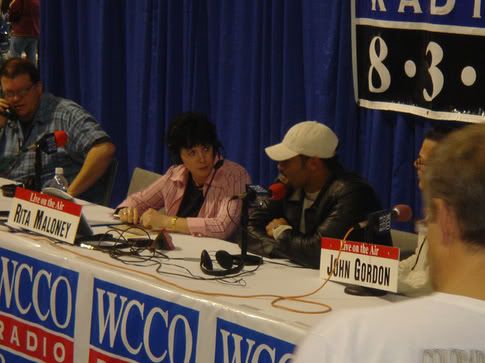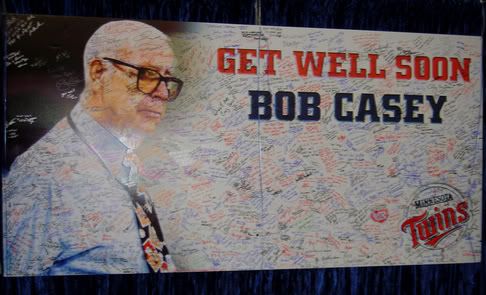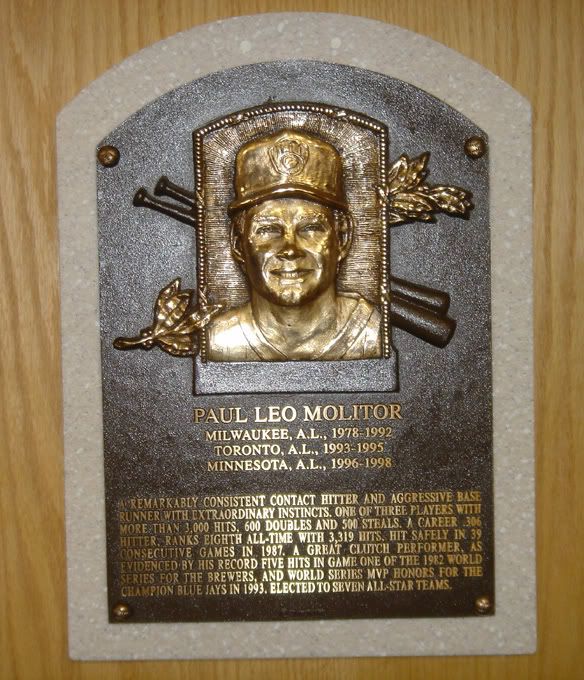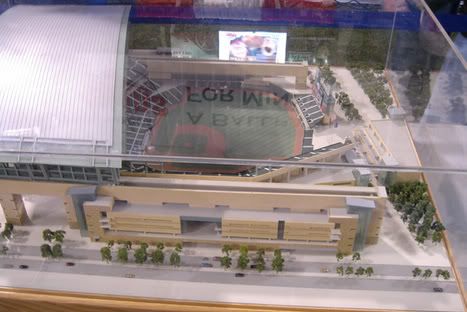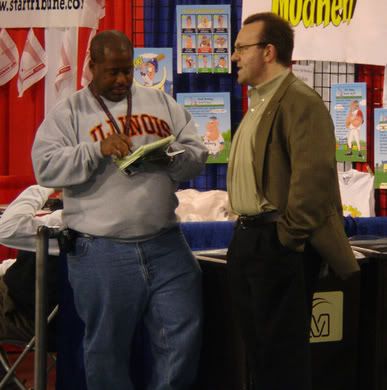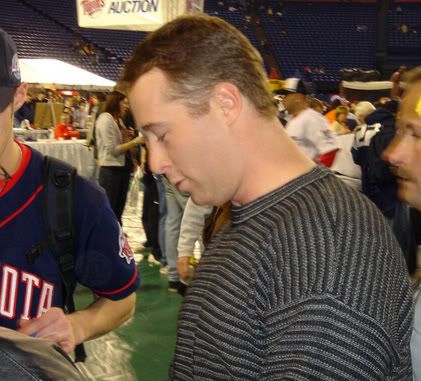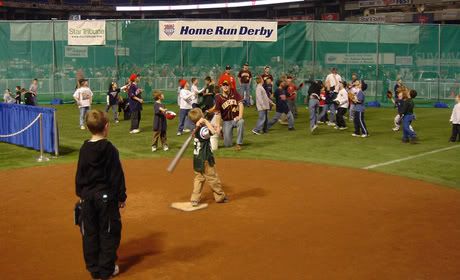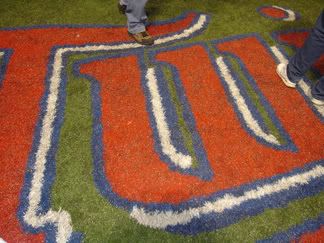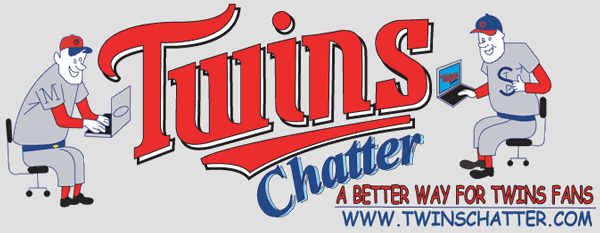From The Hill to the Big Leagues
Interview with Mike Herman ’98: Minnesota Twins Manager of Media and Player RelationsBy the time most people enter the hallowed halls of higher education, they have long since dismissed any dreams of playing professional sports. But have you ever entertained the possibility making a career with a professional sports team? Mike Herman ’98, former Ole baseball player and Messenger sports editor, is living out such a dream. He is currently holds the position of manager of media and player relations for the three-time American League Central Division Champion Minnesota Twins, dealing with players like Johan Santana, Torii Hunter, and Joe Mauer on an everyday basis. Mike recently took some time out from his busy schedule to chat with the Mess from the Twins’ spring training home in Fort Myers, Fla.What were some of the reasons you chose St. Olaf in the first place?Well I actually started college at Iowa State for a semester, but then I realized I still wanted to play baseball in college. A good friend of mine told me to swing by St. Olaf on my way home from Iowa State, which I did. I talked to [head baseball coach] Matt McDonald, and we decided it would be a good fit for me to transfer.
Coming into college, what were some of your career aspirations?I wanted to go into sports broadcasting. I had done internships with TV stations and also in media relations departments of sports teams. But originally, I wanted to be on TV, but that quickly faded when I realized what my financial situation would be after college. I wanted to make money right away; I didn’t want to work for nothing for some small town station. I wanted a job related to sports and somehow related to the media.
How did your St. Olaf education prepare you for your current career? What would you say are some of the advantages or disadvantages to attending a small, liberal arts college (at least in your line of work)?I think the biggest advantages of going to a school like St. Olaf is that communication in general is so important. Because it’s such a small school, you always have to work with different groups of people—whether it’s talking to all the coaches as the sports editor or being in class with people from all different walks of life. I had to understand and relate to everyone I came into contact with, and I think that helped me a lot in my current field.
For instance, it’s easy for me to sit and talk with a Japanese reporter, and, despite the language barrier, I’m able to communicate with him and help him get whatever he needs. St. Olaf is a place that really promotes diversity, and I was able to meet a lot of people from a lot of different places while I was there.
I would say a disadvantage is the fact that there was no specific major for what I wanted to do. That’s a problem for a lot of people when they want to get into this line of work. People ask us what sorts of things they need to do school-wise in order to get into this field, and our response is always it doesn’t matter where you go to school or what your major is, as long as you have the background through internships or independent studies—that’s the way to get a job. If I looked at every resume that came across my desk, they would all have the same types of school training. They would all be advertising, public relations, journalism, or communications majors. The classes themselves prepare you in some ways, but they don’t get you the job. The job comes from the work you do outside the classroom.
How would you say your experience in collegiate athletics impacted your life?It was definitely a great opportunity for me to play [baseball] at St. Olaf. At a smaller school like St. Olaf, it’s kind of similar to high school in some ways. You have a group of friends that you hang out with most of the time, and when I got to St. Olaf I instantly had 35 guys that I knew, and they all had friends that I was now connected to. As a transfer student, this helped me become more comfortable in that new setting. That first semester [as a first-year] is when you make many of your friends, and sometimes there’s a sort of wall around that group that’s tough to break through. But I was lucky enough not to have to deal with that, because I had my friends on the team.
Being on the team also allowed me to maintain that competitive drive I had in high school as an athlete. [Being competitive] has helped me here with the Twins because you can’t break into and succeed in this business if you are passive. Through my athletic involvement, I was able to learn that if I want something, I have to go after it. It’s also about proving to my employer that once I get in, I can still be successful at what I do. Just like Coach McDonald had enough confidence to send me out to the mound and hold a close lead, my bosses have to know that I’m going to go into that clubhouse and get all the interviews done that I need to get done, not just blow them off.
You went through a number of different career changes before you ended up here with the Twins. Can you take us through that path?As a sophomore, I interned for KARE 11 during the summer. My freshmen and sophomore years I also worked for the sports information department, writing articles, interviewing coaches, calling the Star Tribune to give them scores, stuff like that. I was also the sports editor for the Messenger as a junior, and I also wrote some stories after that. I interned with the Phoenix Coyotes for two j-terms. After I graduated, I also interned for a TV station in South Dakota, and that’s when I started realizing that I needed to get away from the TV industry and into the public/media relations area.
Then I started as an intern with the Twins in the winter of 1999. A friend of mine worked for Midwest Sports Channel (MSC), and she was always on the lookout for me for jobs. One day she called me and told me the Twins were looking for someone in media relations, although it was only an internship. I said “I don’t care” and called the guy up anyways. Even though they already had their candidates, the guy agreed to take a look at my resume. I called him an hour later and he agreed to interview me. One day I got a call (actually the day before my birthday) offering me the internship, and I’ve been there ever since. I got the full-time job just before the 2000 season.
As the media and player relations manager, what exactly does your job entail?I set up interviews, and generally take care of any media requests that come in—commercials, public service announcements, and player appearances (like an autograph signing)—I set all that stuff up. A lot of it is media services; whatever the media wants. My job is to make our club as accessible as any other club in major league baseball. This means that we need to do a lot more than the Yankees in terms of media services, because everyone wants to cover the Yankees.
Another aspect of my job is taking care of the baseball information, like stats, game notes, and baseball-related press releases. Basically, we disseminate information. Our job is to get as much information out there as possible promoting the Twins. There are some cases where we have to deliver negative information, but we try to put a positive spin on it if at all possible.
How does your job differ during Spring Training?It’s pretty much the same thing. We have a lot more interview requests during spring training, just because there are so many more players. For example, because Justin Morneau is from Canada, we get every radio station in Canada wanting to kick off baseball season by interviewing Justin. But because there are so many of them, we have to be careful about how we handle it. Everyone thinks that when you come to Florida for four weeks it’s a vacation, but it’s actually a lot of work down here. I’m not complaining, but we put in long days under the hot sun and humidity. But it’s still a good time.
What would you say are some of your favorite parts of your job?
Number one, I get to watch baseball for a living. Growing up, playing the game, I just love the game of baseball. I get to be around a great organization, one of the best organizations in the league to work for. PR people from different teams come into our office when their team is in town and comment on how there’s a different feel when you walk around the Twins offices. Everyone’s happy, everyone’s upbeat. Part of that is because the upper management treats everyone so well. In our organization, most people still come from within. You start here, you keep moving up, and finally, you get to the top.
One of my other favorite things is that I get to travel a lot. I get to go on a lot of road trips, see a lot of different cities and ballparks, and meet a bunch of different people.
What are some of the disadvantages?I do have to put in a lot of hours, which is hard sometimes. Also, sometimes you do have to deal with the egos [of the players]. We’ve been pretty lucky on the Twins—we don’t have many guys that are that egotistical. A lot of the times you just have to be careful what you ask of these guys. They’re financially secure; they don’t need $100 here, $100 there. You have to pick and choose when you go to them for a favor.
What is so unique about the Twins organization that allows them to win all these awards like Baseball America’s “Organization of the Year”?On the field, I think a lot of it comes from scouting and development. Our minor league system has always been known as one of the stronger systems in the game, so the credit there has to go to our minor league coaches, scouts, our general manager, assistant general manager—people like that. Another thing, which I mentioned earlier, is that everybody (even upper management) respects everyone else, regardless of where you are on the totem pole.
That also applies to the baseball side of things. We have so many homegrown players, especially compared to teams like the Yankees that barely even have a farm system [due to trades], and we always know there’s someone in the minor leagues that can come up and help us. There’s a “Twins way” of playing, and it’s taught in the minor league system. If we call a guy up, he knows what’s expected from him in order to get to the major leagues, because that’s all they’ve been pounding in his head for the last six years. That’s why this organization.
As a Twins fan, I’m curious: How do you think the 2005 Twins will fare?I don’t see why we can’t repeat as Central Division champions. Our pitching staff is still one of the best in the major leagues. In spring training we lead the American League in earned run average. There’s still the matter of getting production out of the shortstop position but other than that, we should be just fine.

